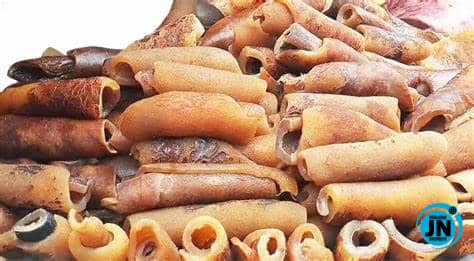The Federal Government has issued a strong warning about the rising trend of consuming cowhides and skins, popularly referred to as ponmo, highlighting that this practice poses a significant threat to Nigeria’s leather industry, which is currently valued at approximately $5 billion.
The caution was delivered during the National Campaign Against the Consumption of Ponmo, held on Thursday, November 13, 2025, in Abuja. The campaign aimed to raise awareness about the economic, industrial, and health consequences associated with diverting hides and skins from industrial purposes to food consumption.

Ponmo consumption threatens leather industry
Speaking at the event, the Director-General of the Raw Materials Research and Development Council (RMRDC), Prof. Nnanyelugo Ikemounso, emphasized that the increasing diversion of cowhides and skins for consumption severely limits the availability of essential raw materials for local leather manufacturers. He explained that the leather sector relies heavily on these materials to maintain production capacity, generate employment, and sustain export revenue streams.
Prof. Ikemounso presented data showing that Nigeria’s leather goods market was valued at $2.79 billion in 2024, with projections estimating growth to $4.96 billion by 2033. He warned that the continued use of hides for ponmo consumption could undermine these growth prospects, reducing national economic gains and limiting the country’s competitiveness in the global leather value chain.[/p>
He stated …
“From an economic and industrial standpoint, cowhides are among Nigeria’s most valuable raw materials. Our nation has a vibrant leather industry capable of creating jobs, generating foreign exchange, and contributing significantly to GDP.
“As of 2024, the Nigerian Leather Goods Market stood at USD 2.79 billion, with forecasts to grow to USD 4.96 billion by 2033.
“However, the ongoing diversion of hides for ponmo consumption denies our industries access to high-quality raw materials, weakens the tanning and leather manufacturing sector, and diminishes Nigeria’s standing in the global leather market.”
He further highlighted that the global leather industry is estimated to be worth between $420 billion and $1 trillion, emphasizing that Nigeria has substantial potential to expand its market share. However, achieving this requires consistent access to raw materials, proper infrastructure, and supportive government policies. Safeguarding hides for industrial purposes is therefore essential to ensure Nigeria’s participation and competitiveness in the international leather market.
Prof. Ikemounso clarified that the campaign is not intended to dismiss cultural traditions or personal dietary choices. Rather, it seeks to encourage strategic use of hides and skins for national development and industrial growth. He urged Nigerians to support the leather sector, which he described as one of the country’s most promising non-oil industries.
“It is important to clarify that this campaign is not against cultural practices or individual food preferences,” Ikemounso said. “Instead, it is a strategic intervention aimed at prioritizing the industrial use of hides and skins, particularly for leather production, which holds immense potential for economic growth, employment, and export diversification.”
The DG also raised concerns about the health implications of consuming ponmo. He pointed out that hides offer minimal nutritional value, consisting largely of collagen with very little protein or essential micronutrients, making them an unreliable food source. Additionally, he warned that many hides sold for consumption are processed with harmful substances such as formalin, diesel, and other chemicals not fit for human consumption, which can cause organ damage and increase the risk of cancer.
He added that redirecting hides and skins toward industrial use not only protects the leather industry but also promotes public health and ensures long-term economic benefits. Nigerians were urged to consider these factors when making food choices, prioritizing both personal well-being and the country’s industrial growth.
“From a nutritional standpoint, ponmo offers very little benefit. More concerning, many hides intended for consumption are treated with dangerous chemicals such as formalin and diesel, posing serious health risks, including organ damage and elevated cancer risk,” he added.
“By promoting the industrial use of hides, we can safeguard public health, strengthen our leather industry, and create sustainable economic opportunities for Nigeria,” Prof. Ikemounso concluded.